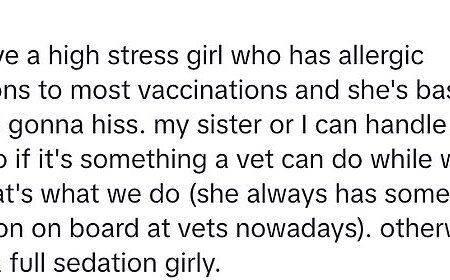A UK-based veterinarian has revealed why you should never shout at your cat – particularly when they are playing up at the vets.
On top of his veterinary work, Ben the Vet makes videos on TikTok, where he has more than 200,000 followers.
He often shares clips about animal welfare topics, sharing information on how to care for different animals, or the health issues often suffered by pedigree species.
A recent video titled ‘Shouting at Cats’, was accompanied by a short caption which simply read: ‘Don’t shout at your angry cats at the vets please, thank you.’
During the video, referencing people who shout at the cats when they are having a veterinary appointment, Ben said: ‘This is literally the last thing you should do if your cat goes on attack mode at the vets.
‘But so many people do it.
‘There is literally not one cat on this earth that would respond to that by calming down.’
Explaining why he believes some people shout at their cats when taking them to the vets, he said that it could be that ‘people feel embarrassed when their cats react like this, and usually the cat is perfectly lovely at home’.

TikTok creator and veterinarian Ben the Vet (pictured) has revealed why you shouldn’t should at your cats when taking them to the vets
The animal welfare expert (pictured) explained why shouting at your cat when they are stressed is not a good idea
However, he explained: ‘But you have to remember that coming to the vets is a pretty scary experience for a cat [there are] lots of different smells, sounds of other they might hear dogs in the waiting room.
‘They can smell loads of different animals. It’s unfamiliar […] so it feels very threatening.’
Ben then moved on to giving advice as to what people should do if they find themselves in this position.
He explained: ‘The best thing you can do in this situation is just stay as quiet as possible, and that’s what we do as well.
‘When we’re handling these cats, we’ll often handle them with a big blanket or towel, try and keep them in their carrier, perhaps, and just prioritise the parts of the examination that we really need to do.’
He explained that they will do this while ‘keeping ourselves safe, because cat bites are nasty’.
If a situation is really serious, and a cat is really stressed often, Ben said vets may ‘prescribe sedative medication that they can be given before consultation and then just get them back in a few days or a week later’.
Concluding the video, he said: ‘But please don’t shout at them, they […] react like this because they are terrified and shouting at them will just make it worse.’
Some viewers took to the comments section of the video to share their thoughts on what Ben had said.
Some viewers took to the comments section of the video to share their thoughts on what Ben had said (pictured)
One wrote: ‘Well said Ben, shouting at a scared, possibly aggressive cat is a big no no, your NOT going to win this battle in that way. NO WAY NO HOW.’
Another said: ‘Cats don’t resounding to negative influences so fear free and positive all the way.’
A third added: ‘I get this. Domestic animals don’t usually like loud noises. When my Jack runs out the door, I scamper out to the car singing “car riiide…car ride, who wants a car ride?” & open the car door. Works!’
Meanwhile, a fourth explained how they helped their stressed animal at the vet, writing: ‘We have a high stress girl who has allergic reactions to most vaccinations and she’s basically always gonna hiss. my sister or I can handle her fine, so if it’s something a vet can do while we hold her that’s what we do (she always has some sedation on board at vets nowadays). otherwise, she’s a full sedation girly.’
And a fifth simply said: ‘I never shout at my fur babies.’


